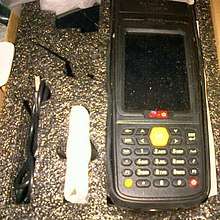INEC card reader
Used in Voting, the INEC card reader is a portable Electronic voting authentication device configured to read only the Permanent Voter Cards (PVCs) issued by the Independent National Electoral Commission (INEC).[1] The card reader was designed specifically for the accreditation process, authentication of eligible voters before voting.[2] The machine was configured to read only the PVCs of a particular polling unit and can only work on election day.[3]

Operation
The device uses a cryptographic technology with an ultra-low power consumption and processing frequency of 1.2 GHz and uses Android 4.0.0[4]
It is positioned by its operators (usually trained INEC officials) to read the embedded chip on the Personal Voter Card (PVC). This card is placed into the device, which then displays the voter's details. The voter places their thumb on the device, and their identity is confirmed through Fingerprint authentication.[5] It usually takes about 10 to 20 seconds to validate a voter.[6]
On completion of accreditation process, a "Close V" key is used to complete the accreditation process and the total number of voters accredited can be previewed using a "Query" key. Afterwards, the result may be forwarded to INEC using the "Communication" key.[7]
The card reader was first used for Nigeria's presidential election held on March 28, 2015.[8][9]
References
- "The Card Reader Controversy, Articles - THISDAY LIVE". thisdaylive.com. Archived from the original on 2015-03-29. Retrieved 2015-03-28.
- "INEC Mock poll exposes Card Readers' flaws - Vanguard News". Vanguard News.
- "Mixed Results Trail INEC's Mock Trial of Card Readers, Articles - THISDAY LIVE". thisdaylive.com. Archived from the original on 2015-04-02. Retrieved 2015-03-28.
- Leadership Newspaper (21 March 2015). "Card Reader Is Configured To Work Only On Election Days – Paschal". Nigerian News from Leadership News.
- "Smart Card Reader Configured To Work At Particular Polling Unit - INEC - Channels Television". Channels Television.
- Our Correspondent. "New Telegraph – The constitutionality or otherwise of using electronic card reader in the 2015 general elections (2)". newtelegraphonline.com. Archived from the original on 2015-04-02. Retrieved 2015-03-28.
- Gbade Ogunwale, Assistant Editor, Abuja; Jide Orintunsin Minna; Ogochukwu Anioke, Abakaliki; Kolade Adeyemi, Kano; Austine Tsenzughul, Bauchi; Vincent Ikuomola, Abuja; Nwanosike Onu, Awka; Shola O’Neil and Okungbowa Aiwerie, Asaba; Precious Dikewoha and Rosemary Nwisi, Port Harcourt; Odunayo Ogunmola, Ado-Ekiti; Fanen Ihyongo, Jalingo. "INEC's card readers test-run largely successful nationwide". The Nation.CS1 maint: multiple names: authors list (link)
- "Card Readers: How Abuja court aborted last minute move to stop election". Vanguard News.
- "We support Inec to use card reader". The Punch News. Archived from the original on 2 April 2015. Retrieved 29 March 2015.